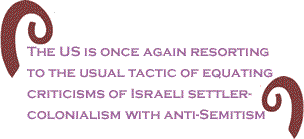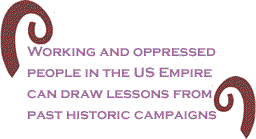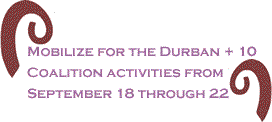The
United Nations General Assembly, made up of 193 member states,
will meet on September 22, 2011 at the UN headquarters in
New York City to
mark the tenth anniversary of the adoption of the Durban
Declaration and Programme of Action (DDPA). Containing a
series of principles and proposals for fighting racism,
the
62-page DDPA [PDF] was passed at the 2001 World Conference
Against Racism in Durban, South
Africa/Azania.
 Despite
opposition from the imperialist countries led by the US,
the 2001 WCAR became a flashpoint for focusing international
attention on two issues: reparations for slavery
and the liberation of Palestine. It involved a convergence of several events: the official
meeting of member states that adopted the DDPA; the NGO
Forum that approved a substantially stronger document (the
WCAR
NGO Forum Declaration); a two-day general
strike led by COSATU against the privatization of social
services in South Africa/Azania; and daily protest marches
outside the conference venue regarding land reform, Palestine,
and reparations. The government meeting was marked by a
walkout of the US, Canadian, and Israeli delegations. Despite
opposition from the imperialist countries led by the US,
the 2001 WCAR became a flashpoint for focusing international
attention on two issues: reparations for slavery
and the liberation of Palestine. It involved a convergence of several events: the official
meeting of member states that adopted the DDPA; the NGO
Forum that approved a substantially stronger document (the
WCAR
NGO Forum Declaration); a two-day general
strike led by COSATU against the privatization of social
services in South Africa/Azania; and daily protest marches
outside the conference venue regarding land reform, Palestine,
and reparations. The government meeting was marked by a
walkout of the US, Canadian, and Israeli delegations.
A
2009 review conference took place in Geneva,
Switzerland
following the 2001 WCAR and reaffirmed the DDPA. The US,
Canada,
Israel, and seven other rich
countries boycotted this meeting as well.
Now,
ten years after the Durban
conference, delegates representing the member states of
the UN will discuss the DDPA again � this time in Midtown
Manhattan. The Obama administration, along with the governments
of Australia, Canada, the Czech Republic, Israel, Italy,
and the Netherlands, have already announced plans to boycott
the gathering. Combined with this boycott, the lackeys and
mouthpieces of the US ruling class are already working to
derail the conference with false charges of anti-Semitism
and jingoistic references to the 9/11 attacks (see for example
the 6/3 New York Daily News editorial �President
Obama must organize an international boycott of obscene,
anti-Semitic Durban III confab� which contains blatant falsehoods
about the content of the DDPA).
Why is the Us Empire So Afraid?
The
Obama administration�s decision to boycott the September
2011 conference in NYC was announced in a June letter
from Joseph E. Macmanus, acting U.S. assistant secretary of
state for legislative affairs, addressed to some members
of Congress.  The
letter claimed that the US
was boycotting, because the Durban
and follow-up conferences have �included ugly displays of
intolerance and anti-Semitism.� The
letter claimed that the US
was boycotting, because the Durban
and follow-up conferences have �included ugly displays of
intolerance and anti-Semitism.�
Two
years ago, the Obama administration released a more detailed
press statement regarding its decision to boycott the 2009
review conference in Geneva. Titled, �U.S. Posture Toward the Durban Review Conference and
Participation in the UN Human Rights Council,� the statement
opposed the reaffirmation of the DDPA and outlined the conditions
for a document that would be tolerable to the US:
It
must not single out any one country or conflict, nor embrace
the troubling concept of �defamation of religion.� The U.S.
also believes an acceptable document should not go further
than the DDPA on the issue of reparations for slavery.
The
Obama administration�s reasons for boycotting the September
2011 conference in NYC and the 2009 review conference in
Geneva are pretenses for shutting down
criticism of Israel. Out of 341 paragraphs, the DDPA contains
four paragraphs on Palestine,
hardly any �singling out� of the Zionist entity. To protect
its attack dog in the Middle East, the US
is once again resorting to the usual tactic of equating
criticisms of Israeli settler-colonialism with anti-Semitism.
The
Obama administration�s non-participation is neither surprising
nor exceptional. It exposes the fact that this administration
continues to carry out the strategic interests of the US
ruling class in maintaining white supremacist national oppression
inside the Empire and in dominating the people of the world.
The
Bush administration deliberately sent a low-level delegation
to the 2001 WCAR, which did not include secretary of state
Colin Powell, and then recalled it in the middle of the
conference.  During
the Carter and Reagan administrations respectively, the
US boycotted
the 1978 and 1983 World Conferences to Combat Racism and
Racial Discrimination in Geneva, where
UN member states condemned apartheid in South Africa/Azania
as a crime against humanity and denou nced Israel�s
collaborative relationship with the apartheid regime. During
the Carter and Reagan administrations respectively, the
US boycotted
the 1978 and 1983 World Conferences to Combat Racism and
Racial Discrimination in Geneva, where
UN member states condemned apartheid in South Africa/Azania
as a crime against humanity and denou nced Israel�s
collaborative relationship with the apartheid regime.
Why
is the US Empire so afraid of participating in UN-sponsored
conferences on racism and racial discrimination? While the
one-country-one-vote forum of the UN General Assembly is
certainly more difficult to control than the UN Security
Council or an exclusive gathering of the imperialist countries,
most of the countries in the General Assembly are neocolonial
states, run by local elites that play varying roles in administering
imperialist relations. Thus, why does the US have such a record of non-participation?
First,
there exist real contradictions in foreign policy between
the US ruling class and certain dependent countries,
even while the latter do not break fundamentally with the
imperialist system and are not reliable allies of the peoples�
movements. Second, each of these UN-sponsored gatherings
is a forum for shaping the views of people around the world,
where peoples� movements have the opportunity to influence
international public opinion through militant street mobilizations
outside conference venues.
Both
of these factors contribute to the possibility of embarrassment
and isolation at any UN function for the US
ruling class, which sits at the head of a country with racism
in its DNA. To paraphrase Mao, here is one arena where it
is not the people who fear US imperialism, but it is US imperialism that fears
the people of the world.

A Hard Look at the Text of the DDPA
The
DDPA is not legally binding or enforceable under international
law. It derives its authority from moral recognition and
the commitment of UN member states to implement its provisions.
As such, the struggle over the DDPA�s language is primarily
an ideological struggle over how to understand history and
our present conditions. Viewed in this way, it is a compromised
text. The DDPA contains a few provisions that could be
advances in the fight against racism if seized by the peoples�
movements, but embodies a capitulation to the imperialist
countries in some other important ways.
The
most important advance made in the text is the acknowledgement
in Paragraph 13 that �slavery and the slave trade are a
crime against humanity and should always have been so, especially
the transatlantic slave trade.� The term �crime against
humanity� carries weight under international law and the
recognition of slavery as such may have given a boost to
reparations
litigation. Yet, at the same time, the DDPA
does not contain any language advocating reparations for
slavery. It only expresses profound �regret� for slavery
and states in Paragraph 100 that �some States have taken
the initiative to apologize and have paid reparation, where
appropriate, for grave and massive violations committed.�
Beyond that, there are only general provisions discussing
the right of all victims of racism, racial discrimination,
xenophobia, and related intolerance to seek �just and adequate
reparation.� Furthermore, the DDPA fails to similarly characterize
colonialism as a �crime against humanity.� There is much
further to push.
 The
four paragraphs discussing Palestine
in the DDPA are even more timid. Paragraph 65, discussing
the right of refugees to return voluntarily to their homes
and properties, provides no indication that it is addressing
Palestinian refugees in particular. This should be contrasted
with the
declaration and programme of action adopted at the 1978
World Conference to Combat Racism and Racial Discrimination
which referred explicitly to the Nakba (Arabic for �catastrophe�
� the name given to the 1948 mass expulsion): �the cruel
tragedy which befell the Palestinian people 30 years ago
and which the[y] continue to endure today � manifested in
their being prevented from exercising their right to self-determination
on the soil of their homeland, in the dispersal of hundreds
of thousands of Palestinians, the prevention of their return
to their homes, and the establishment therein of settlers
from abroad.� The
four paragraphs discussing Palestine
in the DDPA are even more timid. Paragraph 65, discussing
the right of refugees to return voluntarily to their homes
and properties, provides no indication that it is addressing
Palestinian refugees in particular. This should be contrasted
with the
declaration and programme of action adopted at the 1978
World Conference to Combat Racism and Racial Discrimination
which referred explicitly to the Nakba (Arabic for �catastrophe�
� the name given to the 1948 mass expulsion): �the cruel
tragedy which befell the Palestinian people 30 years ago
and which the[y] continue to endure today � manifested in
their being prevented from exercising their right to self-determination
on the soil of their homeland, in the dispersal of hundreds
of thousands of Palestinians, the prevention of their return
to their homes, and the establishment therein of settlers
from abroad.�
The
leading provision Paragraph 63 simultaneously recognizes
the Palestinian right to self-determination and to the establishment
of an independent state alongside �the right to security
for all States in the region, including Israel.� The previous declarations
and programmes of action adopted at the 1978 and 1983 World
Conferences to Combat Racism did not condition the Palestinian
right to self-determination on Israel�s security. In that
respect, the DDPA is a step backward. Further, note that
the text discusses the right of States to �security,�
not people or populations, in effect codifying the existing
states in the region. This is a predictable gesture in a
document adopted by the UN member states, yet ironic in
light of the North African and Arab democratic revolts.
Finally, of course, UN General Assembly Resolution 3379,
which correctly identified Zionism as a form of racism and
remained in place from 1975 to 1991, continues to set the
bar in the struggle within the UN over the proper characterization
of Israeli settler-colonialism and its ideology.
Build the Peoples� Movements, Isolate the US Imperialists
 As
September 22 approaches, working and oppressed people in
the US Empire can draw lessons from past historic campaigns
to bring the crimes of the US ruling classes before the UN. In 1951, Paul
Robeson and William L. Patterson presented a petition to
UN officials titled, �We Charge Genocide� condemning the
oppression of Black people in the US,
reflected in the widespread practice of lynching. Malcolm
X would again raise the call during the 1960s for Black
people to use the UN as a forum to expose their oppression
in the US.
In 1970, the Young Lords and the Puerto Rican Student Union
organized a march of 10,000 people to the UN demanding independence
for Puerto Rico, the release of political
prisoners, and an end to police violence. In 1979, the National
Black Human Rights Coalition organized a 5,000-strong march
to the UN, with the slogans �Black People Charge Genocide�
and �Human Rights is the Right to Self-Determination.� There
should be a renewed focus today on the UN as an important
site of struggle for working and oppressed people in the
US. As
September 22 approaches, working and oppressed people in
the US Empire can draw lessons from past historic campaigns
to bring the crimes of the US ruling classes before the UN. In 1951, Paul
Robeson and William L. Patterson presented a petition to
UN officials titled, �We Charge Genocide� condemning the
oppression of Black people in the US,
reflected in the widespread practice of lynching. Malcolm
X would again raise the call during the 1960s for Black
people to use the UN as a forum to expose their oppression
in the US.
In 1970, the Young Lords and the Puerto Rican Student Union
organized a march of 10,000 people to the UN demanding independence
for Puerto Rico, the release of political
prisoners, and an end to police violence. In 1979, the National
Black Human Rights Coalition organized a 5,000-strong march
to the UN, with the slogans �Black People Charge Genocide�
and �Human Rights is the Right to Self-Determination.� There
should be a renewed focus today on the UN as an important
site of struggle for working and oppressed people in the
US.
COSATU�s
two-day general strike against neoliberal policies on the
eve of the 2001 WCAR in Durban provides a powerful example of how peoples� movements can utilize
such international gatherings to their advantage. The September
22 meeting is taking place not only in the country that
is the home base of the Empire, but in the city that is
the heart of US finance capital. It is
crucial for all working and oppressed people to mobilize
for the Durban
+ 10 Coalition activities from September
18 through 22, especially any protest marches that are planned.
The
movement for reparations in the US
can broaden and deepen its forces by highlighting the survivals
of slavery in the foundations of US
society today and the failure of Reconstruction to fully
uproot them. Mass incarceration. Racist policing. Schools
that operate like jails. Disproportionate unemployment.
Enduring Black poverty throughout the country and in the
Black Belt south.

In
the weeks leading up to the conference and during the days
of scheduled activity, we must make clear that reparations
for slavery, as well as one hundred years of semi-slave
sharecropping and national oppression that continues to
this day, is a just demand that exposes the true character
of the US Empire. It is a demand that is central to
the liberation of the Black nation and the right of Black
people to self-determination everywhere. It is a demand
for the global redistribution of wealth stolen by the Empire.
Without it, socialism is impossible.
BlackCommentator.com Guest Commentator, Jehan Abad, is a member of the Oppressed Nationalities
Commission of Freedom Road Socialist Organization / Organizaci�n Socialista del Camino
para la Libertad. Click here
to contact Jehan Abad. |

